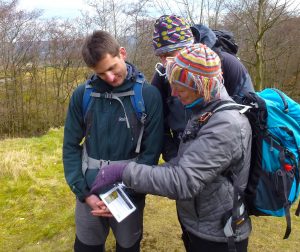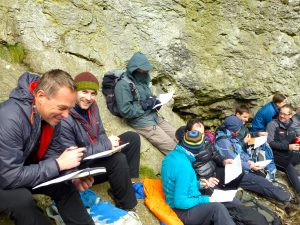As a child I was brought up not with the wide open spaces of ocean and mountain views but with a canal way where kingfishers would dart with their flash of brilliant blue and orange, the murky waters home to perch and roach that I would catch and verdant banks with abundant blackberries to harvest in the autumn. My point is that nature is all around us and in leading groups in adventure activities we have a responsibility and opportunity to engage our clients with the natural world. We can offer them the key to unlock an interest and appreciation for what nature is out there.
As the outdoor education sector continues to grow it attracts a greater number of instructors, guides and leaders. Years of training and experience go into attaining outdoor qualifications but how much formal training about the environment and natural world do people have? Not everyone has come into the outdoor sector with an environmental discipline from school or university, however, an important attribute of all instructors is to promote a positive message and promote environmental awareness to all our clients.
I am often asked on the various environmental courses I run to identify plants, animals and rocks but additionally what activities and ideas we can use to engage and inspire the groups we lead. My approach is to convey the message that it is less about knowledge than about understanding, enjoyment and connection. Science can be a dry subject if taught badly, hidden behind a wall of complex jargon. It can also be an inspiration, opening a door to a wonderful world of adaptation, survival and ingenuity.
There is a body of evidence linking attitude with knowledge and how this can directly affect a person’s behaviour. Research has also shown that knowledge is necessary for any attitude and that environmental knowledge is essential in promoting positive behaviour. As we are only with our groups for a relatively short period of time it is important that we convey a positive message clearly and we can only hope that they will take what they learn back with them to their day-to- day lives.
Below are a few ideas of how simple activities can encourage a group to be involved in learning and to take ownership of that activity raising environmental awareness and appreciation.
Icebreaker: Identifying with natural features
Ask the group to find a natural feature they identify with and explain why to another person in the group. The group then reconvenes and people introduce their partner and share their feature with the whole group. Responses will vary considerably from profound (I identify with a holly leaf as it is soft but has a prickly side and needs to be handled carefully!) to the superficial (I identify with that cloud as I feel fluffy!). The important message is that they have spent time thinking about their environment and making a connection with it
Exploring connections with place: Stimulus cards
Create a series of focused questions or tasks which guide groups towards noticing elements of the landscape and to encourage them to think about their surroundings in relation to wider issues. Some should encourage expression of feelings, others judgements and analysis.
Developing knowledge: Plant postcards
This is a series of plant (or animal) cards with brief descriptions and a few interesting facts. Issue the cards amongst the group and when one is found that person tells the group what it is and some interesting fact about it. It’s also a great way of not having to remember too many facts!Example picture postcard
To join a workshop or environmetnal course contact me here or my Eventbrite page
Learn more about our wildflowers and natural world with a beautifully crafted pack of playing cards. This series of playing cards covers wildflowers, trees of Europe and alpine flowers. There are also wildflower Top trump cards to buy too. Top Trumps are the UK’s best selling card game! Visit our shop to buy.







